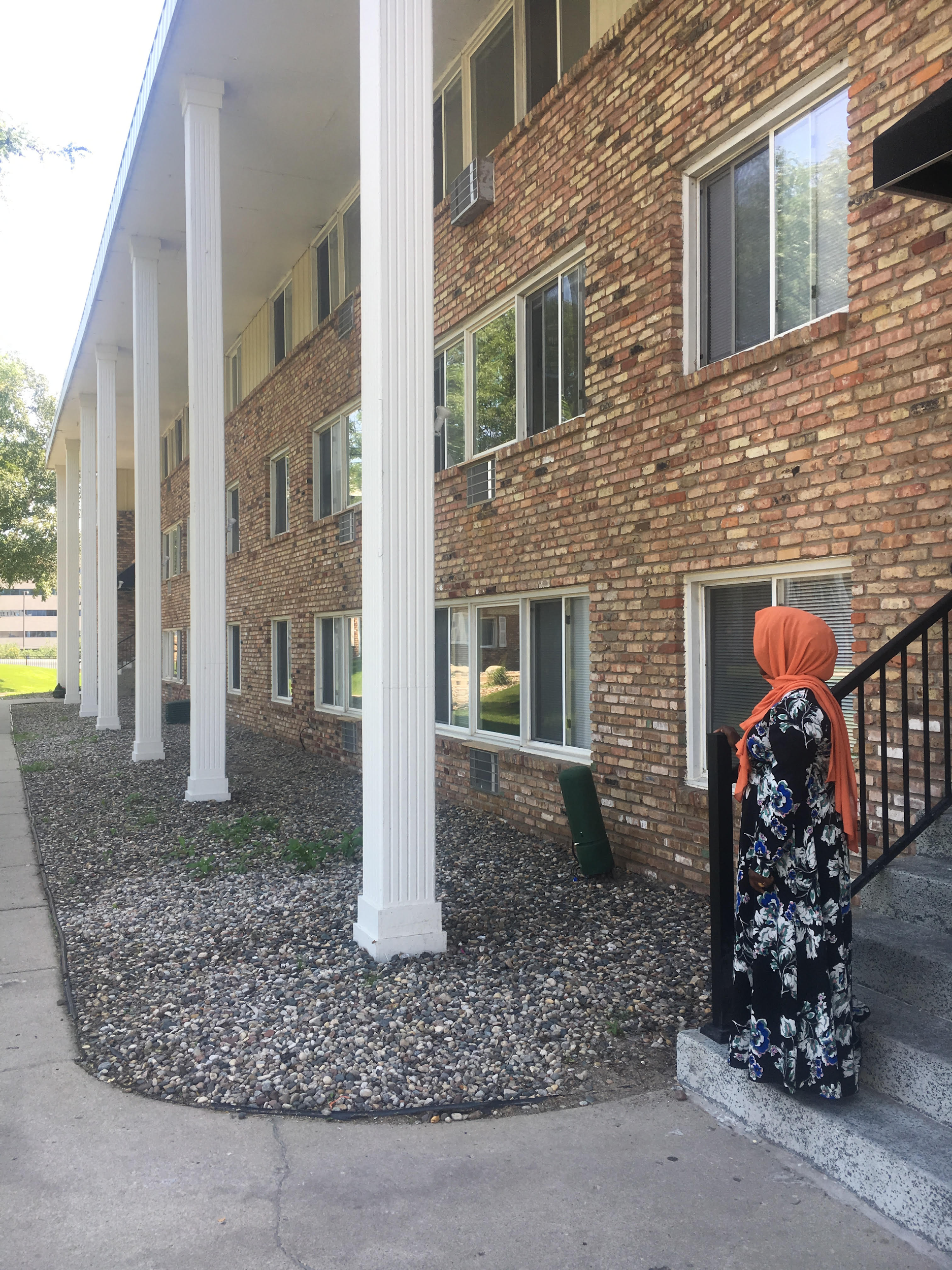MPHA’s illegitimate meetings on the privatization process through R.A.D failed: They hid the negative effects of R.A.D from Elliot Twins & more
————————————————————————————————————-
What is (R.A.D) Rental Assistance Demonstration Program? It is a voluntary program from HUD that allows public housing agencies ( PHA’s) to demolish, transfer ownership of public housing properties that are in bad shape, and PHA can’t afford to take care of in order to demolish, sell the land or transfer ownership for free for private developers. Private developers then apply for tax credit to redevelop the properties into market rate, less than 25% of “affordable units” may be available at the discretion of private landlord. The previous public housing residents can’t come back because they can’t afford these units. R.A.D was supposed to be a selective pilot project for needed buildings only that are in bad shape that PHA’s can’t afford to rehab. But in the past decades, pro-developer lobbyists such as the current Executive Director of MPHA Gregory Russ, and MPHA Commissioners have embedded themselves in public housing agencies and pushed R.A.D to be applied to the best public housing properties for developers to take over, manipulate tax credits, and other affordable housing funds which led to massive displacement of extremely low-income public housing residents all over the nation.
Summary timeline about MPHA’s lack of resident engagement at Elliot Twins:
1. In 2015, Glendale Townhomes residents rejected R.A.D. MPHA targeted Glendale with intentions to sell the land to Sherman Associates because of the high-density boom happening in Glendale’s neighborhood of Prospect Park where the TCF Stadium, Green Line, and U of M are located.
2. It was recently discovered that the Elliot Twins public housing buildings next to the U.S. Bank Stadium are MPHA’s next target. Elliot Twins are in great shape and MPHA’s plan is to sell 99.9 of the building to private developers through the R.A.D program.
- On April 24, 2017, MPHA filed a letter of interest to HUD to apply for R.A.D without notifying tenants. MPHA kept this information hidden from Elliot Twins residents. DG&PHC found out recently from a blog of a developer that MPHA is pushing R.A.D on Elliot Twins.
From April 2017 to July 2018, MPHA excluded Elliot residents from all of the planning process and decision making for the R.A.D application to HUD.
- On July 28, Star Tribune publishes a profile on Gregory Russ and his plans to privatize all the public housing units in Minneapolis through, RA.D including selling the buildings through Low-Income Housing Credit.
- Residents at Elliot Twins would have to find out from this article that Greg Russ was planning to privatize their homes through R.A.D. Almost all of the Elliot Twins residents don’t have access to Star Tribune & many don’t read English.
- The following week, July 30, Greg Russ and MPHA sent letters to Elliot Twins residents informing them that there will be two information meetings about R.A.D held on August 8th and 9th.
3. The two informational meetings on the 8th and 9th of August weren’t legitimate because MPHA excluded residents from the planning and decision making processes involved in applying for R.A.D. Greg Russ made the decision to apply for R.A.D over 15 months ago.
- Elliot Twins residents, Glendale residents, and allies attended both of these meetings as part of Defend Glendale and Public Housing Coalition’s network and allies.
- During the two meetings, MPHA brought police and security to control senior disabled residents and their allies. MPHA announced that they have been planning this application for months, and that they spoke to residents in other buildings, the Minneapolis High-rise Council, and the tenant advisory team.
- Why would MPHA speak to residents in other buildings about Elliot Twins and not speak directly to Elliot Twins residents?
- Elliot Twins tenants who attended the meetings did not know what tenants groups or other buildings MPHA was talking about, or the tenant advisory team they said approved these plans. It was clear that tenant advisory team did not come from Elliot Twins, and that MPHA and Gregory Russ handpick them.
- In addition, Minneapolis High-rise Council (MHRC) does not represent, nor speak for the tenants of Elliot Twins. Elliot Twins tenants already wrote a complaint letter to MPHA about MHRC’s leadership Mary McGovern’s racist and xenophobic tactics including how MPHA covers for MHRC.
- Elliot Twins residents said that they don’t recognize any of the tenant groups MPHA creates because MPHA does not employ open and democratic process, which violates their own civil right.
- Elliot Twins found out for the first time at these meetings that MPHA is rushing to submit the R.A.D application because it is due to HUD on September 2018. Residents had no idea about the details of this application, or its deadline.
- MPHA failed to translate the meetings and the rights of residents in the diverse languages spoken at Elliot Twins.
- During the August 8th meeting, MPHA insisted that residents sign-in order to make public comments. When residents who don’t speak English or know how to write their names told MPHA that they would prefer to give their names orally, MPHA refused, saying residents could not make comments unless they signed in. When it was made clear that residents’ voices were being marginalized, residents walked out. Other tenants also refused to sign in because they did not approve of MPHA’s misleading process.
- During the August 8th meeting, MPHA said residents will receive Section 8 Vouchers, or they will go on a waitlist in other public housing buildings around the city. However, the waitlist for public housing is 7 years with 17,000 waiting to get in, and no one is renting to Section 8 voucher holders. Basically, MPHA was telling resident they will be displaced.
- During the August 9th meeting, MPHA presented the same PowerPoint presentation. Residents walked out again because MPHA told a different story about R.A.D then what they said on the 8th of August. On the 9th of August, MPHA could not answer the questions about displacement. They did not want to answer questions about Section 8 and wait list. They changed the story. So residents saw MPHA was lying. After all the Elliot residents spoke, MPHA refused to listen to comments from Glendale residents about how they previously rejected R.A.D. Mary Boler, MPHA’s Director of Public Housing physically pushed a Glendale resident from the microphone who wanted to speak. Mary grabbed the microphone, pushed the Glendale resident, and blocked the resident from providing a public comment. In addition, Jeff Horwich would not allow allies to comment as well. MPHA attempted to kick out residents for calling out MPHA’s lies, which led to the second walk out in a row.
- HUD requires that MPHA hold two informational meetings. The first meeting to decide if residents want R.A.D, and second meeting for residents to approve any plans that were discussed during the first meeting. The meetings should be some time apart.
- MPHA violated this process and held two meetings back to back providing the same information about the decision they made to apply for R.A.D over 15 months without resident notification or approval. But, during the second meeting, they omitted information they shared the first meeting and failed to answer questions about displacement.
- For MPHA, this was all to check a box in order to move forward with their application, and to do so without resident engagement or participation in the planning process of the last 15 months that excluded Elliot Twins.
- Side note: The Elliot Twins went through a major rehab less than 10 years with additions such as wifi, modernization, etc. The Elliot Twins are in excellent condition. However, it is near the U.S. Bank Stadium in downtown Minneapolis that is very attractive to developers.
- Side note: MPHA has 23 million surplus, and they received 45% increase in funding from HUD in 2018, and this increase will continue in 2019.
- Side note: MPHA refused to lobby for extra funds from City of Minneapolis and State. MPHA did not lobby for the $5 million bonding bill former State Rep. Phyllis Kahn wrote for Glendale in 2016 to keep Glendale public when MPHA wanted to convert Glendale to R.A.D. Therefore, MPHA does not have money issues. MPHA does not want to preserve Elliot Twins as public housing and a public good through available public funds. MPHA want to “Sell, Sell, Sell” as their consultant Peter Hendee Brown advised.
- MPHA’s lack of funds is false narrative they want to use to sell Elliot Twins like they tried in Glendale. MPHA is using the same false tactics they tried in Glendale at Elliot Twins.
- Side note: Greg Russ also knows many union jobs will be lost once he finds a way to dismantle Elliot Twins, and the rest of the public housing.
4. MPHA’s meetings on August 8th and 9th were not legitimate because they hid GAO report findings about R.A.D from Elliot Twins and the rest of the public housing residents
MPHA didn’t share with Elliot Twins and the rest of the public housing population important information about US Government Accountability Office (GAO) report regarding how the R.A.D program is putting public housing residents at risk of chronic displacement around the nations. https://www.gao.gov/products/GAO-18-123. MPHA purposefully failed to share this information.
GOA report states:
- “HUD does not systematically use its data systems to track effects of RAD conversions on resident households (such as changes in rent and income, or relocation) or monitor use of all resident safeguards. Without a comprehensive review of household information and procedures for fully monitoring all resident safeguards, HUD cannot fully assess the effects of RAD on residents. HUD officials stated that HUD intends to develop procedures to identify and respond to risks to long-term affordability, including default or foreclosure in RAD properties. However, HUD has not done so”
- Rep. Maxine Waters (D-California), who called for the GAO report, summarizes key
findings of the report as follows: “Despite RAD’s potential to have serious, negative impacts on tenants( such as changes in rent or relocation), HUD is failing to adequately track these impacts and monitor potential violations of resident rights under relevant statutes and HUD policies.”
As public housing residents, the experience of forced relocation is displacement, loss of community and gentrification. MPHA is using R.A.D as a tool to privatize, sell, gentrify, and displace low income senior community and tenants. MPHA is not using R.A.D to preserve public housing as a public good.
This is an important report because in MPHA’s presentation on RAD, on August 8th and 9th, to Elliot Twins residents, MPHA officials stressed that residents could count on MPHA keeping its R.A.D promises of no displacement, right of return, no rent change, etc.) because HUD will make sure MPHA honors these rights. We know that HUD can’t enforce MPHA to make sure residents are not displaced. We also know that once residents are displaced from their community at Elliot Twins, they will not come back. This is a national trend GAO report admits to. GAO finds that HUD does not have effective monitoring systems in place around these rights to make sure residents are not displaced. MPHA can’t make false promises to residents they can’t keep. MPHA knew about this nationwide study/ report, but MPHA never mentioned this report to its residents at Elliot Twins during August 8th and 9th R.A.D meetings, and they not inform other public housing about this report. MPHA hid this information from residents in order to mislead them to blindly accept R.A.D program. This is deception that puts residents at risk of homelessness and displacement. It is MPHA’s duty to share such important information with resident to protect their civil rights. We believe MPHA did this on purpose and violated residents’ rights to information to protect their rights in order to rush their privatization plans through R.A.D.
Conclusion:
In order to build trust with residents and the rest of Minneapolis community, MPHA must stop lying to the community and tenants of public housing. MPHA must be transparent as to why they want to use R.A.D at Elliot Twins, which is not about the lack of funds, but it is about selling well-built and rehabbed buildings to developers because it is near U.S. Bank Stadium. MPHA must be honest that Elliot Twins community will lose their community, and will be displaced once they are forced to move out. The GAO report stated that residents are facing displacement due to R.A.D. In addition, MPHA does not have any public housing homes for residents to move to currently once they move them out of Elliot Twins. MPHA can’t write a contract with the residents that state residents will move back to their same apartments with the same rent of 30% income as a public housing buildings. MPHA must be honest that they don’t want to access available public funds to keep public housing public, but that their main goal is to “Sell, Sell, Sell”. MPHA must admit that after MPHA turns 99.9% ownership of the Elliot Twins to private developers, MPHA will have no control over the buildings, leases, etc. After MPHA turns the buildings over to the developers, the buildings will be privatized to majority luxury condos with few “affordable units” at below market rate that poor tenants of Elliot Twins can’t afford to rent. The tenants can’t return to due to long waitlist, or they won’t be qualified to rent due to their low- income, and other barriers the private developers creates to deter low-income renters from coming back to their community. In the meantime, during conversion process to R.A.D, vulnerable seniors tenants of Elliot Twins who are majority disabled will be displaced because there are no public housing units available. MPHA has a waitlist of 17,000 people over 7 years waiting to access public housing currently, and no one takes Section 8 vouchers in the private market. These are the two false options MPHA offered to residents on August 8th. MPHA is willing to say anything to convince residents to move out. After resident move out, they are out of MPHA’s hands, which is displacement. Who will be responsible for this intentional housing crisis that MPHA is creating?
Sources:
https://www.gao.gov/products/GAO-18-123.
ttps://www.dgphc.org/2018/08/02/sell-sell-sell-says-peter-hendee-brown-mpha-consultant-mpha-moves-quickly-to-dismantle-public-housing-and-displace-vulnerable-residents-starting-with-elliot-twins-in-ward-6/
https://tinyurl.com/HF3212-0-by-Kahn





